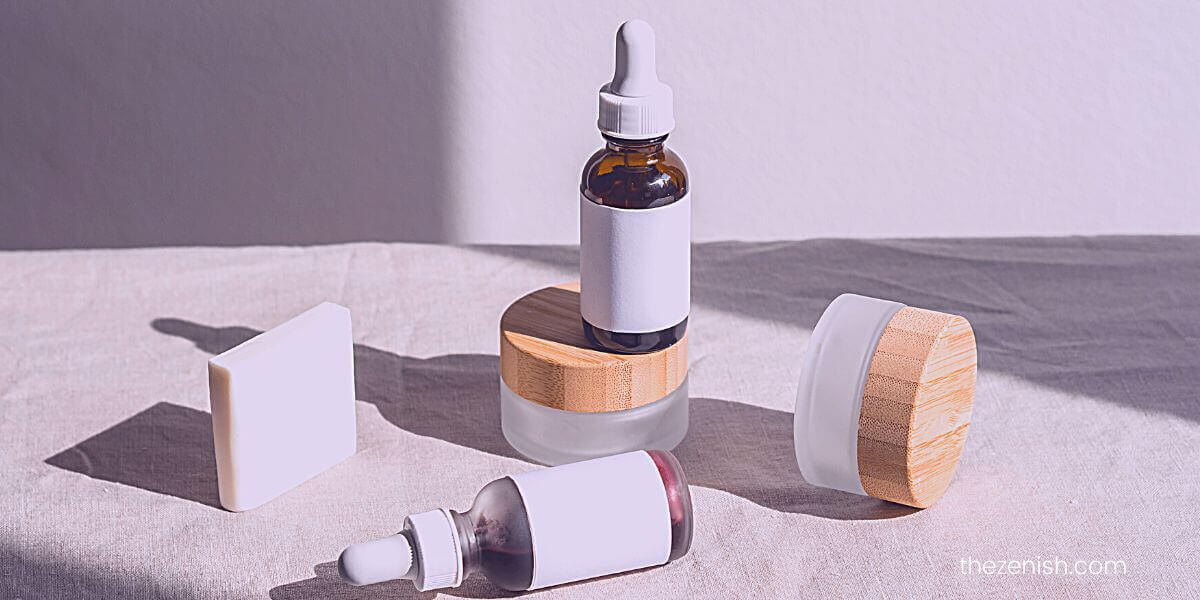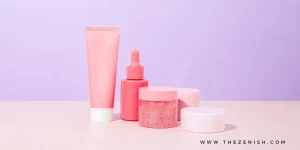Well, is it okay to skip moisturizer after serum?
It’s a valid question and one that’s worth exploring.
After all, who doesn’t love the idea of streamlining their skincare routine?
But before you ditch the moisturizer, let’s take a closer look at whether or not it’s really a good idea

Serums and moisturizers: what do they do and how are they different?
When it comes to skincare, knowing and understanding the difference between serums and moisturizers and how they can benefit your skin is helpful.
So let’s explore them both and their role in skincare.
| this post may contain affiliate links, which means if you purchase from one of these links, I may receive a small commission at no additional cost to you. |
Serums
Serums are generally lightweight, fast-absorbing and have a higher concentration of active ingredients.
These active ingredients target specific skin concerns, like the signs of aging, acne, or hyperpigmentation.
See also:
Here are some common active ingredients found in serums:
- Hyaluronic acid: helps with hydration and plumps the skin
- Vitamin C: aids in skin brightening and combating dark spots
- Retinol: helps to reduce the look of fine lines and wrinkles
- Niacinamide: minimizes redness and inflammation
See also: How to use hyaluronic acid in your skincare routine
Moisturizers
Moisturizers play a crucial part in maintaining your skin’s health.
They work by hydrating and creating a barrier to protect your skin from external factors, such as pollutants or harsh weather conditions.
The main purpose of a moisturizer is to retain moisture within your skin, preventing it from drying out.
Some moisturizers may also contain additional active ingredients to address specific skin concerns.
Is it okay to skip moisturizer after serum?
Knowing all the benefits of using a moisturizer, is it okay to skip it if you’ve already used a serum?
No, and here’s why.
While some serums are formulated with hydrating ingredients like hyaluronic acid, it’s still a good idea to layer a moisturizer over them.
Think about it, serums are packed with active ingredients that target one or two skin concerns, but they’re not moisturizers.
Moisturizers may have small amounts of actives and that’s great but their primary job is to improve your skin’s moisture content, seal in hydration and strengthen its natural protective barrier.
Very different from a serum.
See also: Is it okay to skip moisturizer in the morning?
To really hydrate your skin try combining a hydrating serum like The Ordinary’s Hyaluronic Acid 2% + B5 with a lightweight moisturizer like CeraVe PM Facial Moisturizing Lotion.
This combination should hydrate and protect your skin without feeling heavy.
FAQs
- Can I use serum without moisturizer? If you have normal or super oily skin you might be able to get away with using serum without moisturizer, but most skin types will still benefit from the added hydration and barrier protection that a moisturizer provides.
- Should I apply serum before or after moisturizer? Apply serum before moisturizer since serums are more lightweight, allowing the active ingredients to penetrate the skin more effectively.
That being said, there are always exceptions, and your skin could be one of them.
So if you find that your skin is content with only a serum (no dryness or breakouts, etc.), then you can skip the moisturizer.
After all, you know your skin best.
Importance of serums in skincare
Serums like moisturizers play an important role in your skincare routine, providing targeted treatment and essential nutrients to your skin.
Unlike moisturizers they are formulated with higher concentrations of active ingredients and smaller molecular weights, allowing them to penetrate deeper into your skin.
Let’s dive into the different types of serums suitable for different skin types and their benefits for aging and acne.
What type of serum should you use for your skin type?
Dry skin
If you have dry skin you’ll want to look for serums containing hydrating ingredients like hyaluronic acid, glycerin, or ceramides.
These ingredients help attract and retain moisture in your skin, providing intense hydration.
Product suggestions:
1. Drunk Elephant B-Hydra Intensive Hydration Serum
2. Biossance Squalane + Vitamin C Rose Oil
3. Kiehl’s Hydro-Plumping Re-Texturizing Serum Concentrate
Oily skin
For oily skin choose lightweight serums with ingredients like niacinamide, salicylic acid, or tea tree oil to help regulate oil production and prevent breakouts.
These ingredients also have antibacterial properties, making them effective for acne-prone skin.
Product suggestions:
1. Naturium Niacinamide Serum 12% Plus Zinc 2%
2. Cocokind Vitamin C Serum with Sea Grape Caviar
3. The Inkey List Niacinamide Oil Control Serum
Sensitive skin
Soothing serums with gentle ingredients like chamomile, aloe vera, and green tea extract can help calm irritation and redness for the most sensitive skin.
These ingredients offer anti-inflammatory benefits to keep your skin comfortable.
Product suggestions:
1. La Roche-Posay Toleriane Ultra Sensitive Skin Face Serum
2. First Aid Beauty Ultra Repair Hydrating Serum
3. Biossance Squalane + Phyto-Retinol Serum
See also: Can you use retinol if you have sensitive skin?
Combination skin
For combination skin choose serums that can target specific concerns like uneven skin tone, fine lines, or acne.
Ingredients like retinol, vitamin C, or peptides can address multiple concerns, making them suitable for multiple skin types.
Product suggestions:
1. Peach & Lily Glass Skin Refining Serum
2. Drunk Elephant T.L.C. Framboos Glycolic Resurfacing Night Serum
3. The Ordinary Niacinamide 10% + Zinc 1%
Benefits of serums for aging and acne
Aging
Serums can provide tremendous benefits for aging skin by:
- Boosting collagen production: Ingredients like retinol and peptides promote collagen production, helping to maintain your skin’s elasticity and reducing fine lines and wrinkles.
- Increasing cell turnover: Alpha-hydroxy acids (AHAs) and retinoids help exfoliate dead skin cells and reveal fresher, more youthful skin.
- Brightening skin tone: Vitamin C and niacinamide work on reducing age spots and hyperpigmentation, leaving you with a more even and radiant complexion.
Product suggestions:
1. SkinCeuticals C E Ferulic Serum
2. Olay Regenerist Retinol 24-Night Serum
3. Sunday Riley A+ High-Dose Retinoid Serum
Acne
For acne-prone skin, serums offer several advantages:
- Clearing pores: Salicylic acid and other exfoliating ingredients help unclog pores and prevent breakouts.
- Reducing inflammation: Ingredients like green tea extract, aloe vera, and niacinamide have anti-inflammatory properties that soothe red, inflamed skin.
- Balancing oil production: Serums containing niacinamide or tea tree oil can help regulate sebum production, reducing excess oil and preventing acne.
Product suggestions:
1. Paula’s Choice Skin Perfecting 2% BHA Liquid Exfoliant
2. The Ordinary Niacinamide 10% + Zinc 1%
3. iS Clinical Super Serum Advance+ (source:
FAQs
Can I use multiple serums at once?
Yes, you can layer serums, but make sure to apply them in order of their consistency, starting with the lightest formula and moving to the thicker ones.
How often should I apply serums?
It depends on the specific serum and your goal. Some serums are meant to be used daily, while others should only be used a few times a week.
Do I need a separate serum for day and night?
It’s unnecessary, but some serums work better during the day (e.g., vitamin C) while others are more effective at night (e.g., retinol).
Do I still have to apply moisturizer after using a serum?
Yes. In general, it’s better to use a moisturizer after using a serum to help seal in the active ingredients and provide additional hydration.
However, if you have oily skin you may find that a serum alone provides enough hydration.



